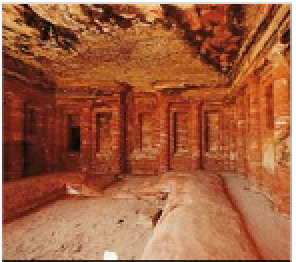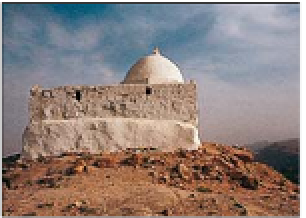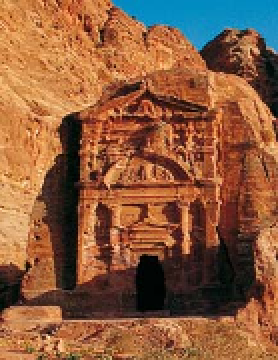Travel Reference
In-Depth Information
valley is a spectacular stepped
descent, sometimes with sheer
drops. The first thing you see,
carved into the rock face, is the
Lion Monument
, representing
the goddess al-Uzza. It was
originally a fountain, perhaps
for pilgrims to the High Place,
with water pouring from the
lion's mouth. Water channels
W
and the shape of the lion's
head and legs can still be seen.
Thereafter, the path becomes
a series of steps leading to the
delightfully secluded
Garden
Triclinium
. The tomb takes its
name from the surrounding
greenery. On top of the
tomb is a large cistern. Further
along, to the left, is the
Tomb
of the Roman Soldier
, so
called because of the remains
Aaron's Tomb
This site is venerated by
Muslims, Christians and
Jews as the place where
Moses's brother Aaron
was buried. The white
dome of the shrine can
be seen from the High
Place of Sacrifice, which
may be a close enough
viewing for most people.
The journey there involves
a three-hour ride on
horseback and a hard three-
hour climb to the top of
Petra's highest peak - Jebel
Haroun. For those determined
to go, a guide and adequate
supplies are essential.
The lonely mountaintop shrine of Aaron's
Tomb, Petra's holiest place
Mughar el-Nasara
, including
the fine
Tomb with Armour
.
Local Christians were probably
responsible for the many
crosses etched into the walls.
Little Petra
This northern suburb of Petra,
Siq el-Berid, has come to be
known as Little Petra because
it is like a miniature version of
the main city. Situated 8 km
(5 miles) north of Wadi Musa
W
town, it is most
easily reached by
taxi. The journey on
foot, north along the
Wadi
Tomb of Sextius Florentinus
Beyond the Palace Tomb
(see
p226)
, along a track skirting
the cliff, stands the
Tomb of
Sextius Florentinus
. Despite
its badly eroded north-facing
façade, the beautiful
and unusual details
of its design are
clearly visible. Above
its entrance is a Latin
inscription listing the
positions held by
Florentinus up to his
last post as Governor
of Arabia in AD 127.
Further north is the
Carmine Façade
with its vivid stria-
tions of red, blue
and grey. Continuing alongside
the Wadi Mataha brings you
W
to a rock-cut complex known
as the
House of Dorotheos
because of two Greek inscrip-
tions found here. On the other
side of the wadi is a cluster of
homes and tombs known as
W Abu Ullayqa,
which starts just past
the Qasr el-Bint, is
hard, but rewarding.
A guide is essential.
A
Little Petra seems
to have been a
largely residential
settlement, as rela-
tively few tombs
have been discovered here.
It may well have been where
Petra's wealthy merchants had
their homes. Just outside its
Siq-like entrance, which was
once controlled by a gate, are
a large cistern and a Classical
temple. The gorge, shorter
than the one leading into
Petra, contains a simple
temple. As you emerge
from the quiet of the gorge
into the town, the incredible
profusion of façades is
overwhelming, with houses,
temples and cisterns carved
into every exposed rock
face. Flights of steps shoot
off in all directions, evoking
images of a bustling urban
centre. One of Little Petra's
main attractions is the
Painted House
with its
plaster ceiling and walls
delightfully decorated with
flowers, vines, bunches of
grapes, Eros with his bow
and Pan playing his pipes.
Beautifully carved interior of the
Triclinium, unusual for Petra
Detail from ceiling
of the Painted House
in one of the façade niches of
a figure wearing the uniform
of a high-ranking Roman
officer. Although Classical, the
façade has Nabataean “horned”
capitals on top of the pillars.
Opposite is the façadeless
Triclinium
, thought have been
part of the Roman Soldier
Tomb complex. It has the only
T
carved interior in Petra and its
niches, fluted half columns
and cornice are spectacularly
enhanced by the amazing
bands of colour running
through the walls and ceiling.
Further down the track is
the relatively plain
Broken
Pediment Tomb
, named after
its most striking feature. Nearby
is the elegant
Renaissance
To mb
, with the three urns
above its arched entrance.
Similar in style to the Tomb of
Sextius Florentinus, it may date
from the same period. Past
this point the Wadi Farasa
W
widens and the descent ends
in the main valley, not far from
the Qasr el-Bint
(see p228)
.
To m b o f Sextius Florentinus, Roman
governor of the province of Arabia




















